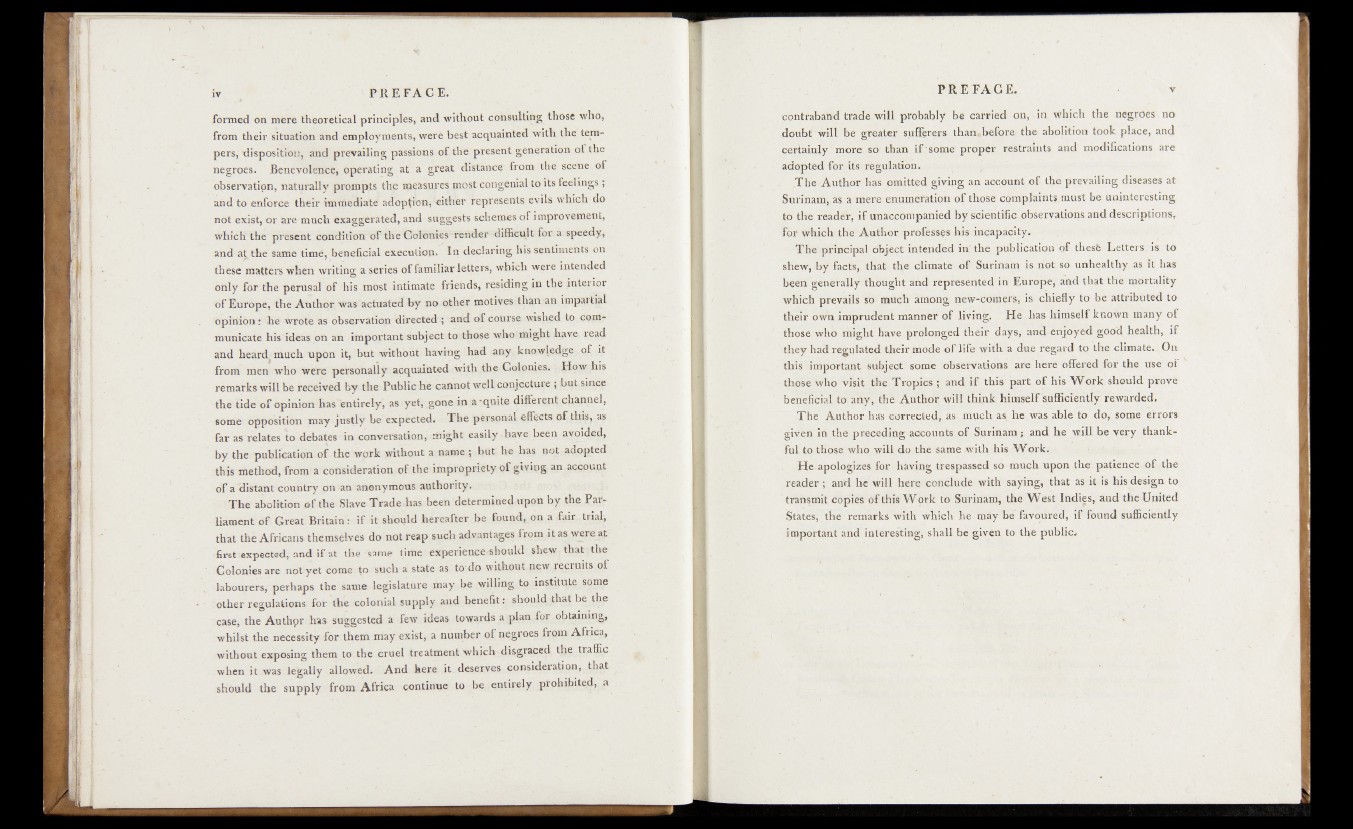
formed on mere theoretical principles* and without consulting those who,
from their situation and employments, were best acquainted with the tempers,
"disposition, and prevailing passions of the present generation of the
negroés. Benevolence, operating at a great distance' from the scene of
observation, naturally prompts the Baeàsnj’es most congenial to its feelings ;
and to enforce their immediate adoption, either represents evils which do
not exist, or are much exaggerated, and suggests schemes of improvement,
which' the présent condition of the Colonies render difficult for a speedy*
and-at*.the same time', beneficial execution. In declaring his sentiments on
these matters when writing a series of familiar letters, which were intended
only for the perusal of his most intimate friends, residing in the interior
of Europe, the Author, was actuated by no other motives, than-an impartial
opinion : he -wrote as observation directed ; and of course wished to communicate
his ideas on an important subject to: those who might have read
and heard-much upon it, but without having had any. knowledge, of fif
from men who were personally acquainted With jthe Colonies. , How his
remarks will be received by the. Public he cannot well conjecture , jbwt frncp
the tide o f opinion fias~entirely, as yet,.gone in a-quite differentchannel,
some opposition may justly be expected. The personal effects of tins, as
far as relates to debates iu conversation, mighp easily% have; been avoided,
by the publication of the work without a name ; but' he has pot adopted
this method, from a consideration of the impropriity of gkiçg; an ,aççpu#^
o f a distant country on an anonymous authority.
The abolition o f the Slave Trade has been determined upon by the JPaiV
liament Of Great Britain : if it should hereafter be found^qn a ffa ir^ a h
that the Africans themselves do not reap such advantages from. it as were at
first expected, and if at the same time: experience^shouid shew. that ; the
Colonies are not y et come J o Such a state as to>dp without n ^ w ^ r u i ts qf
labourers, perhaps the same legislature may be willing to mstjute sqnap
: Other regulations, for the colonial supply and benefit j shouMjha| be , the
case, the Authpr has suggested a few ideas towards a;planfor^obtamirig,
whilst the necessity for them may exist, a number of negroes from Africa,
without exposing them to the cruel treatment which^disgraced thç traffic
when it was legally allowed. And here it deserves consideration, that
should the supply from Africa continue to be, entirely prohibited, a
contraband trade will probably be carried on, in which the negroes no
.doubt1 will be greater sufferers than«before the abolition took place, and
certainly'more so than if some’ proper restraints and modifications are
adopted for its regulation.
.The Author has omitted giving an account o f the prevailing diseases at
Surinam, as a mere énumération o f those complaints, must be uninteresting
to the reader, if unaccompanied by scientific observations and descriptions,
for which the Author professes his incapacity.
The principal object intended in'the publication of thesfe Letters is to
shew, by facts, that the climate of Surinam is not.so unhealthy, as it has
been gënerally thought and represented in Europe, and that the mortality
which prevails so much among new-comers, is chiefly to be attributed to
their own imprudent manner of' living. He has himself known many of
those who might have prolonged their days, and enjoyed good health, if
they had regulated their mode of life with a due regard to the climate... On
this important subject some observations are here offered for the Use of
those who visit the Tropics ; and. if this part of his Work should prove
beneficial to any, the Author will think himself sufficiently rewarded.
The Author has corrected, as much as, he was able to do, some errors
given in the preceding accounts of Surinam ; and he will be very thankful
to those who will do the same with his Work.
He-apologizes for having trespassed so much upon the; patience o f the
reader ; and he will here conclude with saying, that as-it is his design to
■transmit copies trf this Work to Surinam, the West Indies, and the United
States, the remarks with which he maybe favoured, if found sufficiently
important and interesting, shall he given to the public.